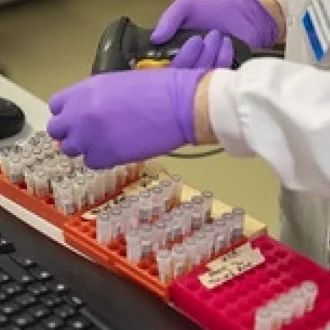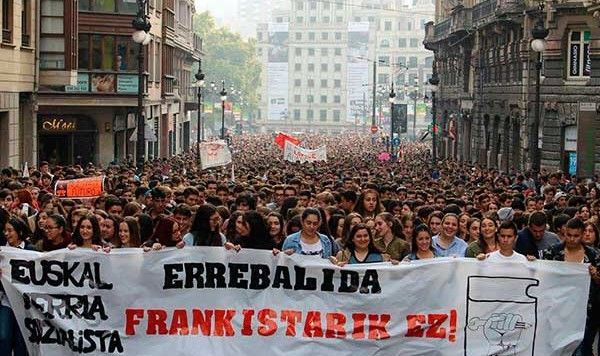Rebecca Green is a member of Socialist Alternative in the US.
Over a year has passed since billions of people’s lives were halted and turned upside down by the COVID-19 pandemic, and while vaccinations are ramping up in some countries, the path to herd immunity is long and steep with hurdles like the threat of vaccine-resistant virus variants. Healthcare systems have collapsed, billionaires have made billions, while billions globally suffer from unemployment, poverty, hunger, and depression. Many of us are desperately looking for a light at the end of the tunnel.
But while the complete failure of capitalism to respond to this pandemic will draw out our battle with COVID, more, deadlier pandemics are on the horizon. Capitalism’s inherently unsustainable exploitation of the earth, rapid deforestation, and infringement on natural ecosystems, much of it driven by farming, are significantly increasing the risk that COVID is not the last, or even the worst pandemic we’ll see.
There are an estimated 1.7 million undiscovered viruses in mammals and birds, about half of which could infect humans. Scientists predict that future pandemics will happen more often, spread faster, and kill more people.
Where Does Disease Come From?
In just the last 20 years, there have been five major epidemics — SARS, MERS, Ebola, avian flu, and swine flu. While identifying the exact origins of epidemics is an extremely complex task, compelling research shows that MERS likely first infected humans through camel livestock in Middle Eastern countries, swine flu through a pig farm in Mexico, the avian flu through domestic waterfowl and live bird markets.
While identifying the exact origins of epidemics is an extremely complex task, compelling research shows that MERS likely first infected humans through camel livestock in Middle Eastern countries, swine flu through a pig farm in Mexico, the avian flu through domestic waterfowl and live bird markets.
COVID-19 likely originated in bats, spread to another animal in the wild that was then brought to a wet market in Wuhan, China, where animals in packed cages with immune systems weakened from stress easily transmit viruses. In each of these cases, it was the passing and mutating of viruses over many years between wild animals like bats, domesticated birds and pigs, and eventually humans that led to outbreaks.
Animal domestication has historically been a key source of the spread of disease among the human population. In Guns, Germs, and Steel, Jared Diamond outlines the origins of countless diseases: measles and tuberculosis from cattle, smallpox from cattle and other livestock, flu from pigs and ducks, pertussis (whooping cough) from pigs, and falciparum malaria from domesticated birds.
This domestication accelerated under early capitalism, as European powers established mass monocrop and livestock operations in colonies to extract wealth and grow their global influence. Imperial powers and, from the outset, their exploitative (of the environment and people) economic pursuits became early vectors of disease that decimated Indigenous populations around the world. The Indigenous peoples of North America, who had never been exposed to measles, smallpox and the flu, suffered dreadful fatalities with up to 90 percent of the population dying rapidly.
Threat of Pandemics to Come
Professor Kate Jones from University College of London says evidence “broadly suggests that human-transformed ecosystems with lower biodiversity, such as agricultural or plantation landscapes, are often associated with increased human risk of many infections.”
Over the past two decades, there is a growing body of evidence that shows how deforestation creates the conditions for transmission of deadly pathogens, from Nipah and Lassa viruses to the parasites that cause malaria and Lyme disease, to COVID-19. Clearing forests means humans venturing into areas with wildlife that carry deadly disease, and taking away these animals’ habitats, forcing them to flee, often into newly established farms and human settlements.
As a recent example, the 2013 West African Ebola outbreak is very likely linked to a rapid pace of deforestation that picked up in 2006 when the Guinean Oil Palm and Rubber Company decided to quadruple its palm oil exports.
Gueckedou, “ground zero” of the outbreak, was surrounded by monoculture palm plantations. Scientists hypothesize that the deforestation to create the plantations disrupted frugivore bats’ (reservoirs of the virus) natural habitats forcing them to graze more on garden crops, and the plantations themselves (which rested in and around human settlements) became a suitable alternative for the displaced animals. All of this increased contact between the virus carrying bats and humans, eventually leading to the deadly outbreak.
Andy MacDonald, disease ecologist at the Earth Research Institute of the University of California, Santa Barara says: “It’s a numbers game: The more we degrade and clear forest habitats, the more likely it is that we’re going to find ourselves in these situations where epidemics of infectious diseases occur.”
Big Ag
An estimated 80% of global deforestation is driven by the agricultural industry, which is also the leading cause of habitat destruction. Agriculture and deforestation are responsible for a quarter of all greenhouse gas emissions. Industrial-style animal agriculture, or factory farming, is a significant factor within this. Cattle ranching (and the soy farms that produce cattle feed) is the biggest cause of deforestation in almost every county in the Amazon region.
The agricultural industry is wildly lucrative and powerful. A dwindling number of corporations control larger and larger sections of global meat production and sale. The top ten global meatpackers alone dominate the industry, and the top three (JBS, Tyson Foods, and Cargill) have triple the sales of Smithfield Foods, fourth on the list. To maximize profits, these companies cut every possible corner.
This means employing precarious immigrant workers to hyper exploit and pay extremely low wages. Meat packing plants have been super-COVID spreaders in many countries, with workers packed closely together, almost like the way the animals were packed together when alive. Many animals are crammed into insufferable cages for lifetime confinement while pumping them with antibiotics and chemicals to fend off disease (80% of antibiotics sold in the U.S. are used on livestock, which itself increase the likelihood of future uncontrollable disease). And it means clearing forests on a mass scale regardless of any of the countless environmental and health consequences to ramp up production.
Commodities that are linked closely with deforestation are expected to boom in coming years. Since 2010, there has been a 45% increase in soy plantations in Brazil and a 75% increase in palm oil production in Indonesia. Globally, by 2050 meat production is expected to rise by 76%, soy by 45%, and palm oil production by nearly 60%.
It’s important to note that many of these operations receive public funds and subsidies, and are highly deregulated by governments around the globe. In the US dairy Confined Animal Feeding Operations (CAFOs) receive tax breaks and subsidies. In the last 10 years, the International Finance Corporation (IFC) (the commercial lending arm of the World Bank) and the European Bank for Reconstruction and Development provided $2.6 billion for beef, pig, and poultry farming, as well as dairy and meat processing. The UK’s development bank, CDC, has invested tens of millions of pounds in global livestock, financing a massive beef feedlot in Ethiopia and poultry companies in Niger and Uganda.
Corporate politicians who pay lip service to the issue of climate change have for decades allowed the inhumane, environmentally-devastating, and public-health-threatening industry to run wild.
Socialist Transformation of Society Needed
Under capitalism, the levers in society that dictate what is produced, how, and where, and for whom, are controlled by private corporations based on what is the most profitable. That is why, despite science showing the dire threat of deforestation to global public health, the highly centralized meat industry is continuing to decimate forests at an alarming rate. This isn’t even simply about the greed of individuals who own the corporations: capitalism necessitates competition, and so if you aren’t driving down costs and maximizing profits, your bottom line is on the line.
The source of all wealth under capitalism is the labor workers do to transform raw materials from the earth or nature into sellable goods. A chunk of metal doesn’t mean much by itself, but turn it into a car part and there is money to be made. Because of this, capitalists will always seek to drive down the cost of materials and labor to maximize profits, cash out, expand, and beat out their competition. This means getting the cheapest, dirtiest materials in the cheapest, crudest way, and pressuring politicians for deregulation so they aren’t on the hook to pay for the toxic chemical leaks, water contamination, air pollution, and infectious diseases that come as a result. It also means forcing more labor out of workers, pitting workers against each other along racial, national, and gender lines, and crushing unions and attempts by workers to unite for better conditions.
It is futile to hope that society can, in any meaningful way, change the present course towards more and worse pandemics and environmental chaos while the economy is privately owned by a handful of super-rich. The logic of capitalism is to maximize profits, which is exactly what the meat and fossil fuel industries are doing. No amount of crisis for poor and working people can itself change the internal workings of this cruel and exploitative system that fundamentally, ideologically views the natural world and people as commodities to be exploited.
Where Do We Start?
A necessary starting point is taking fossil fuel companies, for-profit utilities (which have made the news again in Texas), and major agricultural companies into public ownership. If Tyson Foods, for example, were public, all money they made selling meat could be invested in developing new, humane, and environmentally safe practices in the industry, which would need to include developing meat-alternatives and reforesting decimated areas.
But public ownership under capitalism is not enough, because as these industries will be run by the same bosses with current politicians in charge. Politicians whose pockets are lined with industry money, who slash public services at every opportunity, and have failed to stop the climate catastrophe for decades?
We need democratically elected bodies of workers (from laborers and assembly line workers to mechanics and scientists) in every workplace and industry to make the key decisions about production and distribution as part of a democratically worked out national and international plan based on people’s needs, not profit. As working and poor people bear the brunt of pandemics, extreme weather disasters, and the climate crisis, decision-making about environmental and labor practices would look very different — far more logical and humane — if it were under workers’ control.
These workers’ councils could also shorten the work week, lower absurd productivity requirements, and employ the unemployed to help transition to renewable energy and environmentally sustainable practices, without any loss of pay for anyone. It will take a massive effort to fundamentally restructure our disturbing food and agriculture industries and guarantee that we can feed the global population while bringing the environmental crisis, and it’s devastating health impacts, to a halt.
But if you’re thinking this all would never happen under capitalism: you’re right. It will take a mass movement, and eventually a political and social transformation, to overthrow the power of the capitalists and seize democratic control by the majority, for the majority. Workers in polluting industries, and the labor movement as a whole, have the critical role to play in this process, as they can cripple the profits and power of the capitalists by withholding their labor and mobilizing in the streets and their communities to fight for an alternative.



